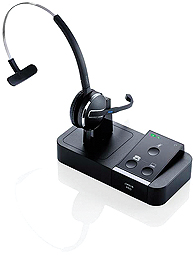
Dialog Semiconductor plc announced Jabra has adopted the company’s short-range wireless audio ICs to create the Jabra PRO™ 9450 Flex JP headset, which connects with office phones and PCs running VoIP calling software, such as Skype or Microsoft Lync.
The Jabra PRO 9450 Flex JP is a stylish, high-performance, lightweight wireless headset and is the first system to use Dialog’s chips for the Japanese variant of the DECT standard. It has up to a 120-metre range, delivers up to 10 hours of talk time and integrates Dialog’s SC14480 single-chip CAT-iq IC in the headset, with Dialog’s LMX4180 DECT transceiver and SC14450 high-end baseband processor in the base-station.
The Jabra PRO 9450 Flex JP is optimised for noisy work environments, while providing industry leading wireless audio quality. The headset runs Dialog’s Perfect Acoustic Echo Canceller (PAEC) and background noise cancellation with a wideband audio codec.
For wireless audio applications, the DECT standard enables energy efficiency enhancements, easy pairing, wide-band audio data rates and secure connectivity. Dialog is the market leader in this segment and its portfolio covers all regional versions of DECT plus the 2.4 GHz DCT protocol and also includes the DECT ULE family of products; SmartPulse. The adoption by Jabra further extends the recent deployment of Dialog’s DECT technologies into a broader range of short range wireless audio applications; including professional headsets, wireless microphones and gaming.
The SC14480 is the world’s first monolithically integrated DECT/DCT solution in standard CMOS and integrates Flash memory and a high-performance Gen2DSP core, which provides the processing power to support the superior voice quality of the CAT-iq standard and other features. The SC14480 can operate directly from Li-ion cells, reducing external component costs and makes the chip ideal for headset applications.
The LMX4180 CMOS RF transceiver supports a variety of DECT variants including standard (1880-1900 MHz) and DECT 6.0 (1920-1930 MHz). It is fully compatible with Dialog’s advanced basebands enabling customers to have a complete solution.
Dialog Semiconductor plc
www.dialog-semiconductor.com


